US domestic crude oil production is continuing to rise. After a slowdown in September it hit a new record according to latest data from EIA.
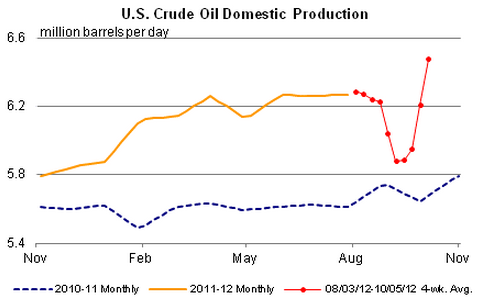
That is keeping the US crude oil inventory above the 5-year range for this time of year. Crude market in the US is well-supplied.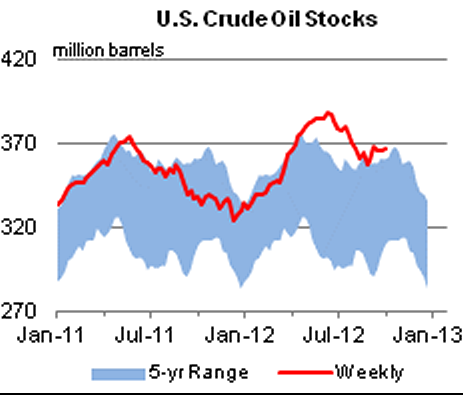
But those who expect these strong supply fundamentals for crude oil in the US to translate into lower fuel costs for consumers will have to wait. Gasoline stocks are at the low end of the range, keeping gas prices at the pump elevated.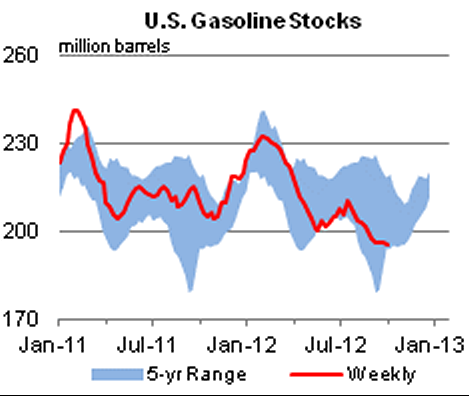
Distillates stocks (jet fuel, heating oil, etc.) are in even worse shape - below the 5-year range.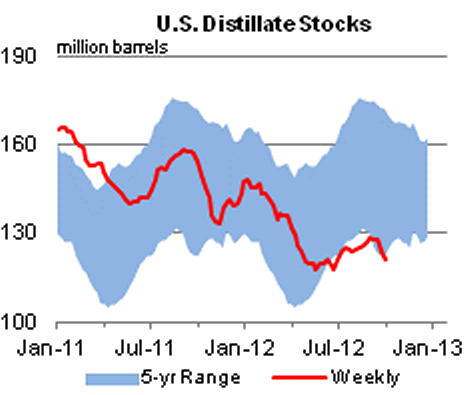
This imbalance of crude vs. refined products supplies keeps crack spreads wide, making US refineries (such as Tesoro for example - see this story from Reuters) a great deal of money. But it is not good news for the cash-strapped US consumer. In fact in some areas of the country fuel shortages have been downright painful. We've discussed the elevated gasoline prices on the West Coast (see post). Now tight heating oil supplies in the North East could pose serious problems if we return to a more seasonal NE winter weather.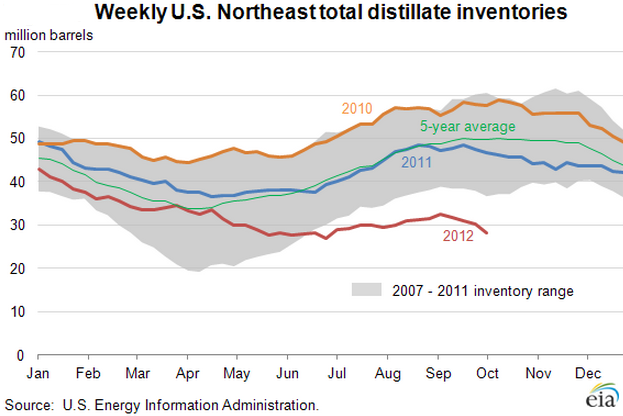
Things could get particularly tough in NY State because of new regulation.
EIA: Market tightness could be exacerbated by a regulatory change in New York state, which starting this heating season limits the sulfur content of home heating oil to 15 parts per million (ppm), matching the sulfur content limit for ultra-low sulfur diesel fuel (ULSD). This change results in an estimated additional 70,000 barrels per day (bbl/d) of ULSD demand on an annual basis, but in times of peak demand - such as during sustained cold temperatures - could be as high as 170,000 bbl/d.
So how is it that with these extra supplies of crude oil, the US is not building adequate stocks in gasoline and distillate fuels? The answer to a large extent has to do with exports. Distillate stocks are at low levels globally, which increases incentives for US refineries to export fuel to other countries.
EIA: The tightness in global distillate markets is reflected in both the futures market prices and inventory levels in the United States. While U.S. distillate production is high, the global supply-demand balance for distillate fuels has created a price structure that has not encouraged inventory builds. In recent weeks, prompt prices for distillate fuel have risen compared to prices for fuel delivered in future months.
For the week ending October 5, distillate inventories in the U.S. Northeast were 28.3 million barrels, about 21.5 million barrels (43 percent) below their five-year average level. Distillate inventories have historically been used to meet normal winter heating demand but are also an important source of supply when demand surges as a result of unexpected or extreme cold spells. The low distillate inventories could contribute to heating oil price volatility this winter. 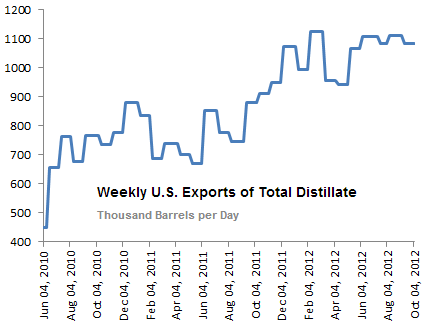
Once again this dispels the old myth that if the US becomes "energy independent," fuel prices at the consumer level will be lower. Liquid fuels trade in global markets and are therefore driven by global supply/demand fundamentals.
- English (UK)
- English (India)
- English (Canada)
- English (Australia)
- English (South Africa)
- English (Philippines)
- English (Nigeria)
- Deutsch
- Español (España)
- Español (México)
- Français
- Italiano
- Nederlands
- Português (Portugal)
- Polski
- Português (Brasil)
- Русский
- Türkçe
- العربية
- Ελληνικά
- Svenska
- Suomi
- עברית
- 日本語
- 한국어
- 简体中文
- 繁體中文
- Bahasa Indonesia
- Bahasa Melayu
- ไทย
- Tiếng Việt
- हिंदी
Rising US Crude Oil Production Is Not Translating Into More Gasoline
Published 10/15/2012, 02:49 AM
Updated 07/09/2023, 06:31 AM
Rising US Crude Oil Production Is Not Translating Into More Gasoline
Rising US Crude Oil Production Is Not Translating Into More Gasoline And Heating Oil For US Consumers
Latest comments
Loading next article…
Install Our App
Risk Disclosure: Trading in financial instruments and/or cryptocurrencies involves high risks including the risk of losing some, or all, of your investment amount, and may not be suitable for all investors. Prices of cryptocurrencies are extremely volatile and may be affected by external factors such as financial, regulatory or political events. Trading on margin increases the financial risks.
Before deciding to trade in financial instrument or cryptocurrencies you should be fully informed of the risks and costs associated with trading the financial markets, carefully consider your investment objectives, level of experience, and risk appetite, and seek professional advice where needed.
Fusion Media would like to remind you that the data contained in this website is not necessarily real-time nor accurate. The data and prices on the website are not necessarily provided by any market or exchange, but may be provided by market makers, and so prices may not be accurate and may differ from the actual price at any given market, meaning prices are indicative and not appropriate for trading purposes. Fusion Media and any provider of the data contained in this website will not accept liability for any loss or damage as a result of your trading, or your reliance on the information contained within this website.
It is prohibited to use, store, reproduce, display, modify, transmit or distribute the data contained in this website without the explicit prior written permission of Fusion Media and/or the data provider. All intellectual property rights are reserved by the providers and/or the exchange providing the data contained in this website.
Fusion Media may be compensated by the advertisers that appear on the website, based on your interaction with the advertisements or advertisers.
Before deciding to trade in financial instrument or cryptocurrencies you should be fully informed of the risks and costs associated with trading the financial markets, carefully consider your investment objectives, level of experience, and risk appetite, and seek professional advice where needed.
Fusion Media would like to remind you that the data contained in this website is not necessarily real-time nor accurate. The data and prices on the website are not necessarily provided by any market or exchange, but may be provided by market makers, and so prices may not be accurate and may differ from the actual price at any given market, meaning prices are indicative and not appropriate for trading purposes. Fusion Media and any provider of the data contained in this website will not accept liability for any loss or damage as a result of your trading, or your reliance on the information contained within this website.
It is prohibited to use, store, reproduce, display, modify, transmit or distribute the data contained in this website without the explicit prior written permission of Fusion Media and/or the data provider. All intellectual property rights are reserved by the providers and/or the exchange providing the data contained in this website.
Fusion Media may be compensated by the advertisers that appear on the website, based on your interaction with the advertisements or advertisers.
© 2007-2024 - Fusion Media Limited. All Rights Reserved.
